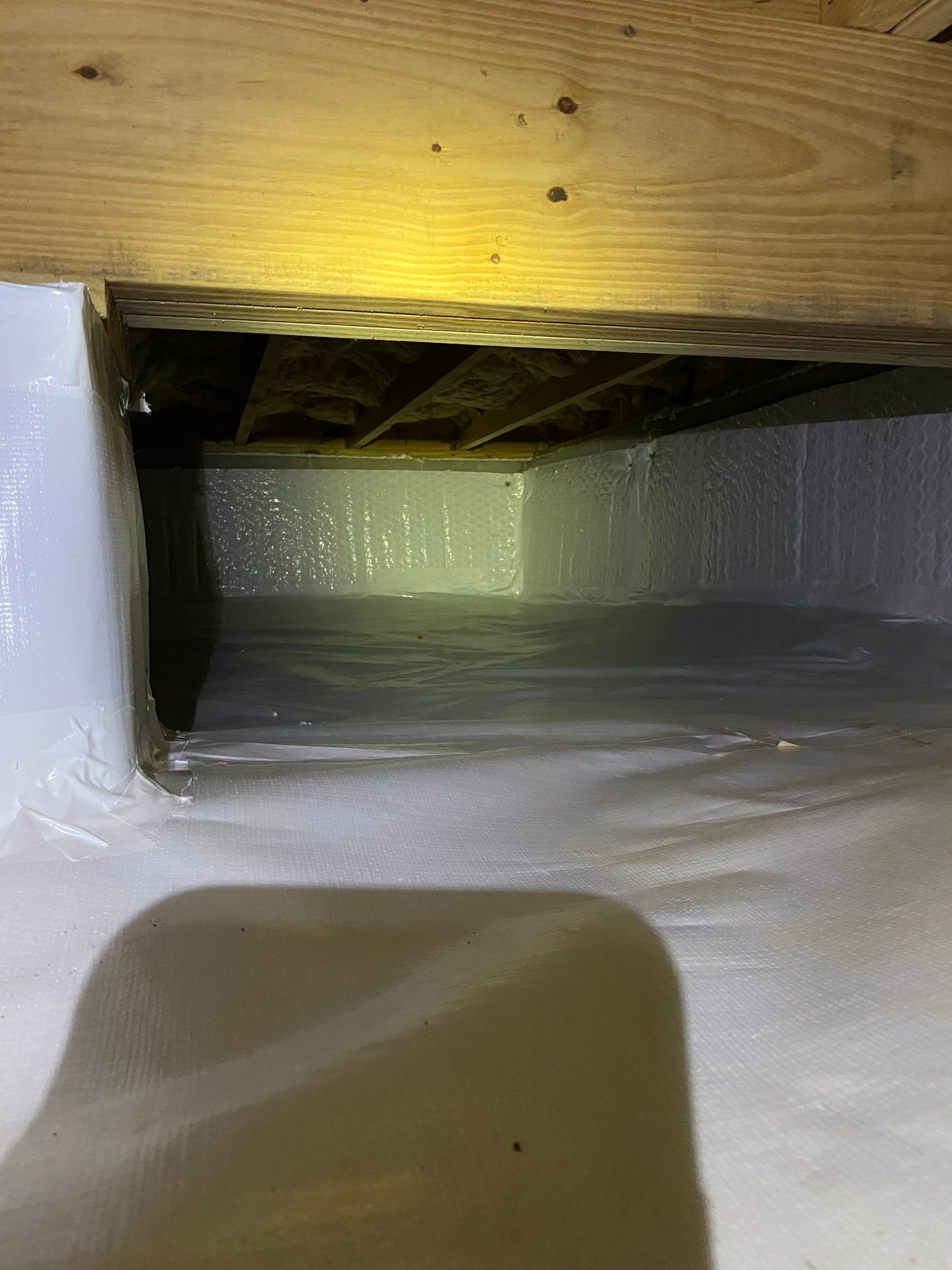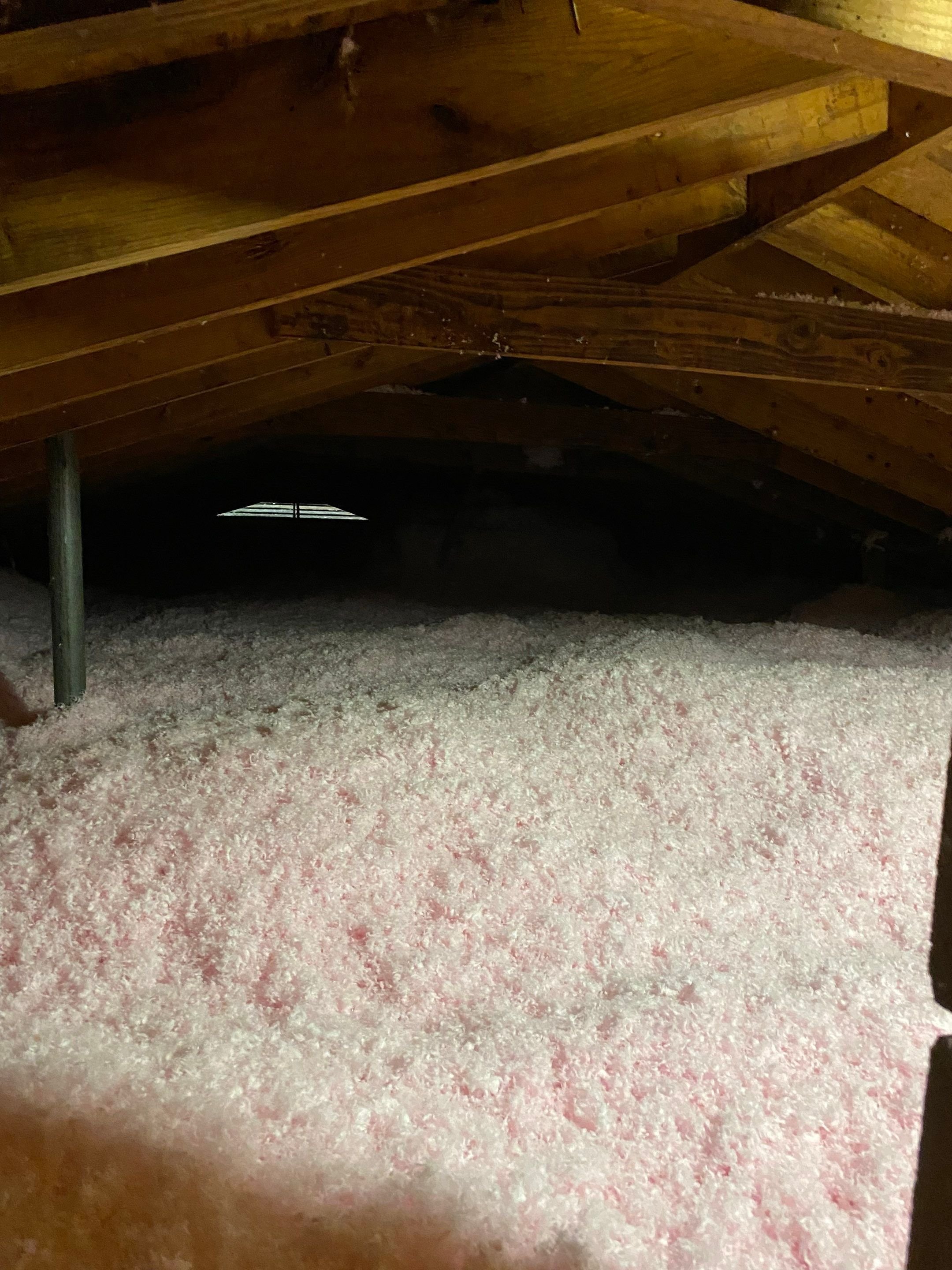
Insulation
Types of Insulation
R-19 Fiberglass Insulation: Standard crawl space insulation required to pass an inspection.
Waterproof Wall Insulation: Highly efficient crawl space insulation that also protects the outer walls to prevent moisture from entering the space.
Rock Wool Insulation: Heavy-duty insulation that is commonly used for sound proofing.
Batt Insulation: R-30 and R-38 batt insulation is commonly used in ceilings and attic spaces.
R-15 Insulation: Most commonly used in wall cavities.
Blow-in Insulation: Installed in attic space. Per NC building code R-38 is the minimum required. Although, more insulation can be installed for a higher R-value.
Insulation can become ineffective over time, especially if there is constant moisture. Moisture causes insulation to fall, attracts pests and enables mold growth. Insulation made today compared to 10 years ago has more advanced thermal technology and resistance to damage.
Old & Damaged Insulation:
Old insulation in crawl space that needs to be replaced.
Damaged insulation in crawl space that needs to be replaced.
Old Attic blow-in insulation
Missing Insulation:
The absence of insulation increases your energy bills and reduces the overall comfort inside your home. Bring your crawl space up to code by installing a minimum of R-19 floor insulation, or R-38 attic insulation.
BENEFITS OF PROPER INSULATION:
Regulates temperatures indoors
Increases comfort of your living environment
Protects air quality
Sound Barrier
Moisture barrier
Reduce energy costs
Attic Insulation
Attic Radiant Barrier: Thermal barrier used to prevent the attic from becoming to hot in the warmer months. Creates an ideal space for storing items in the attic.
Attic Zipper Door: An insulated zipper door along the attic entrance prevents air exchange between the attic and home.
Attic Door Insulation: To pass a North Carolina inspection, insulation is required on some attic doors.
The Leading Insulation Contractor in Raleigh NC and surrounding areas: Save Energy and Boost Comfort
Affordable & Expert Attic, Crawl Space, and Wall Insulation Services Near You
Are you tired of high utility bills and cold, damp floors in your Raleigh NC home? As the area's top-rated insulation contractor, Carolina Casa specializes in home insulation solutions. We deliver results with fiberglass, waterproof wall insulation, blown-in cellulose, and crawl space encapsulation to ensure maximum efficiency and comfort year-round.
Call Now to Speak with an Expert: (919) 630-3202
Clear Signs Your Home Needs New Insulation:
Skyrocketing Energy Bills: Your heating and cooling costs are increasing every year.
Cold, Damp Floors: Uninsulated or improperly insulated crawl spaces lead to cold spots and high humidity underfoot.
Pest or Moisture Damage: Evidence of rodents, mold, or a musty odor coming from your attic or crawl space.
Drafts & Temperature Swings: Rooms are too hot in summer or freezing in winter, indicating poor thermal barriers.
Old, Settled Insulation: Your current fiberglass insulation is thin, dusty, or falling down in the crawl space.
Hanging, sagging or fallen: Once wet insulation loses its fire resistant properties.
Our Expert Insulation Services in Raleigh and the Triangle Area
1. Crawl Space Insulation & Encapsulation
Your crawl space directly affects the air you breathe and the stability of your floors. We specialize in removing old, water-logged crawl space insulation and replacing it with modern, moisture-resistant solutions like waterproof wall insulation or new fiberglass. We also offer full crawl space encapsulation to seal the area, prevent moisture intrusion, and prevent mold.
2. Attic Insulation Installation (Blown-In & Batts)
The attic is the single biggest source of energy loss. We specialize in blown-in fiberglass insulation and batt installation to achieve optimal R-Value (minimum R-38 for our climate zone). We also handle full insulation removal to eliminate contaminated material before installing the new barrier.
3. Wall Insulation & Retrofitting
Many older homes lack proper wall insulation. We use state-of-the-art techniques to improve your home's thermal envelope and offer soundproofing.
Why Choose Carolina Casa for Your Insulation Needs?
Local Expertise: We are a licensed and insured NC insulation contractor focused only on the unique climate and energy codes of Raleigh NC and surrounding areas.
Crawl Space Specialists: Our teams are highly trained in moisture management and crawl space encapsulations.
Guaranteed Quality: We perform a complimentary 6-month follow up to ensure everything is looking good.
Exceptional Customer Service: We are fully licensed, insured, and dedicated to your complete satisfaction.
“Carolina Casa has been nothing short of outstanding. They are true professionals who stand by their word and deliver exactly what they promise. Their work ethic is exceptional, and the quality of their workmanship speaks for itself. What really sets them apart is their honesty and fairness—their pricing is right where it should be, with no overcharging or hidden surprises. Every time they visit, they provide us with detailed photo updates from under our crawl space, giving us peace of mind that everything is being properly maintained. We’re so glad we took advantage of their annual service plan. Knowing that they continue to monitor and ensure our crawl space stays dry gives us confidence year after year that the initial work they performed is still going strong. Carolina Casa is the real deal, and we would not hesitate to recommend them to anyone looking for reliable, professional service.”
— 5 star google review
















